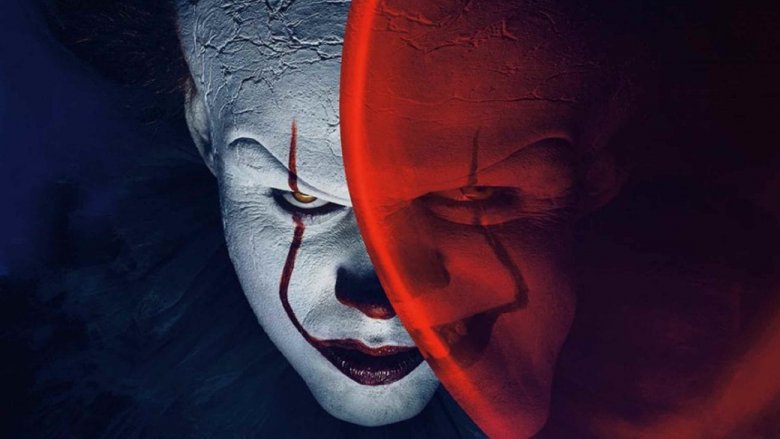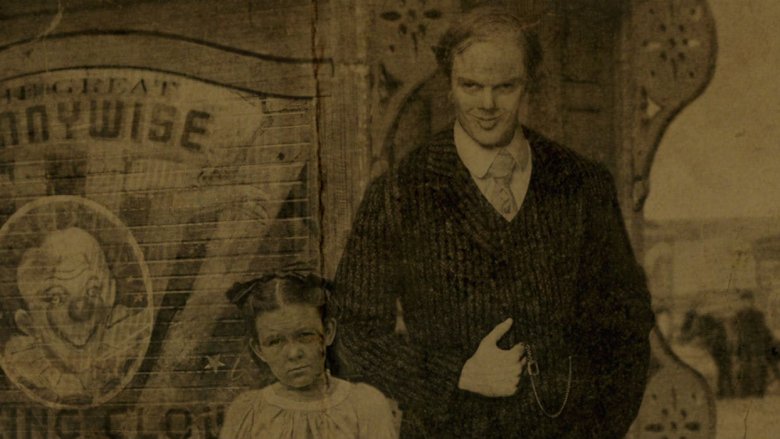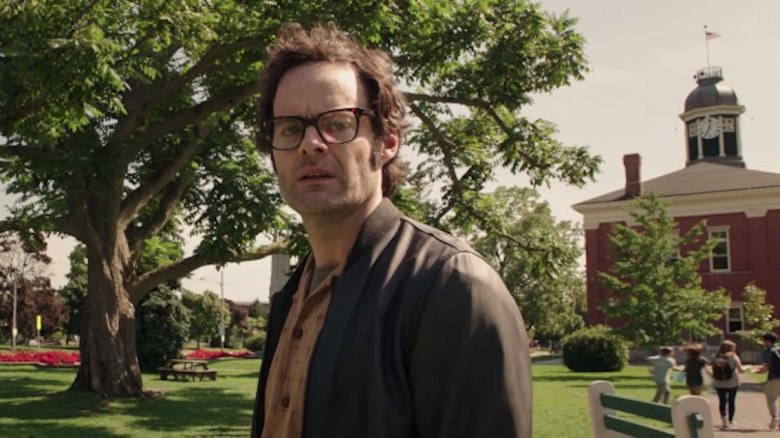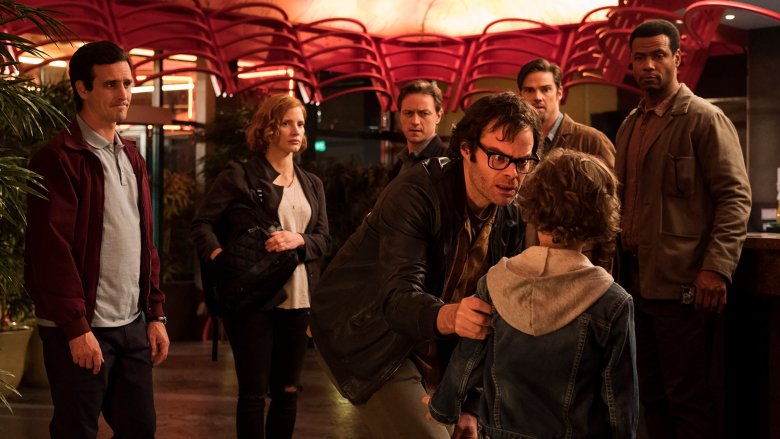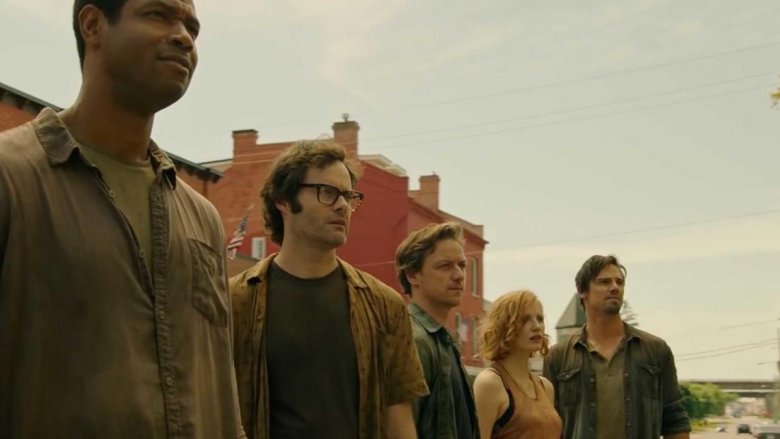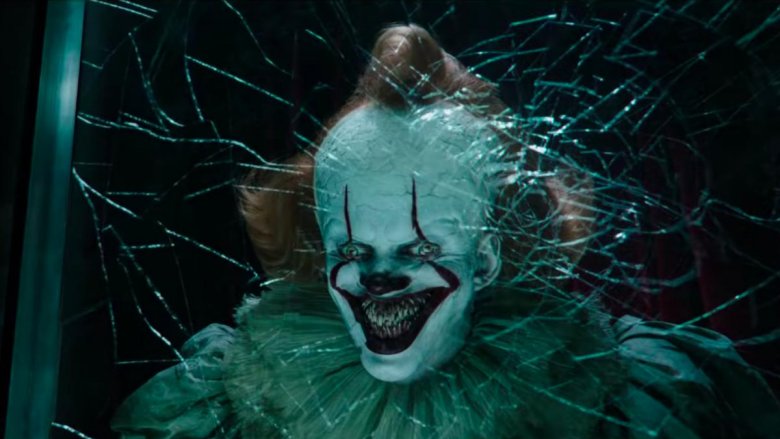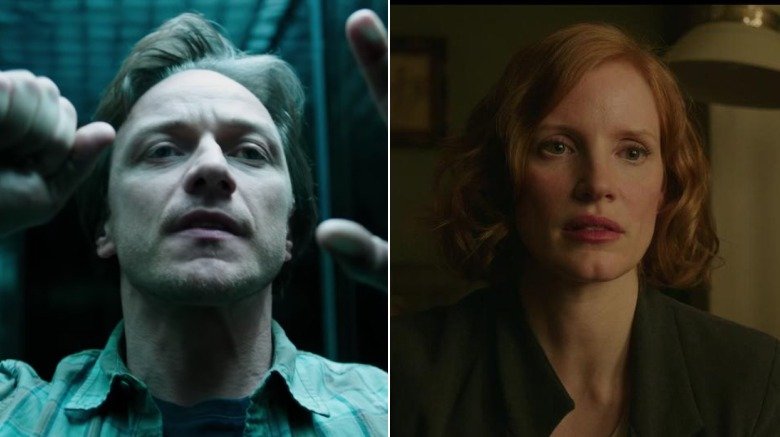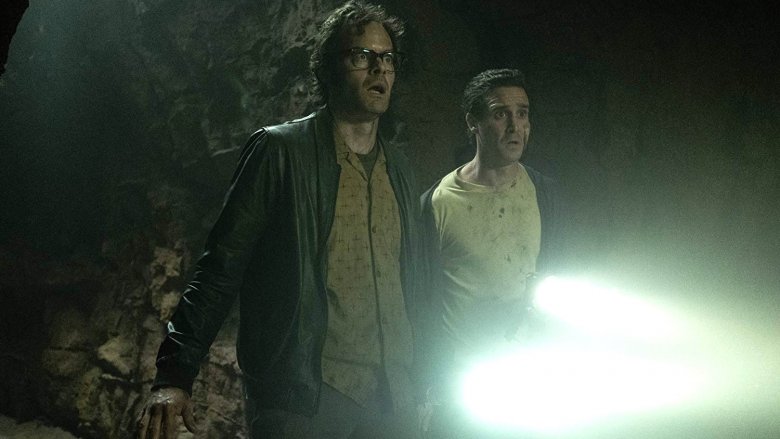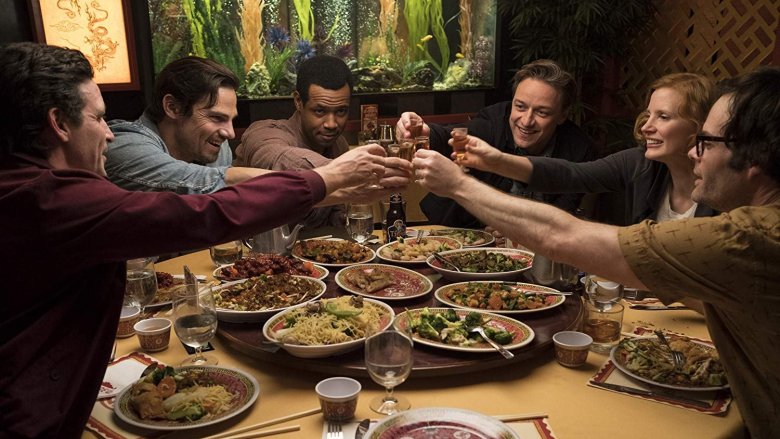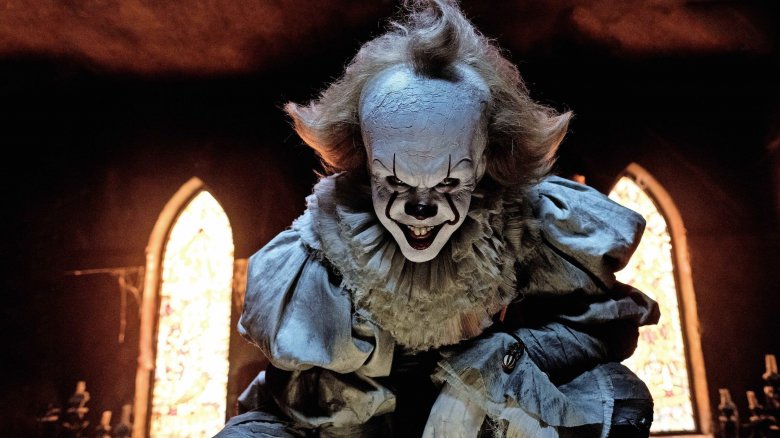It: Chapter Two's Biggest Unanswered Questions
Throughout It: Chapter Two, there's a running gag about author Bill Denbrough's (James McAvoy) work. The leader of the Losers Club introduced in 2017's It grows up to become a successful novelist and screenwriter, but he has one nagging problem — no one likes his endings, not even his wife or the director adapting his stories for the big screen. Director Andy Muschietti is having a little fun with the author of It: Chapter Two's source material, Stephen King, who's endured criticisms about unsatisfying endings for much of his career. Fittingly, King gets in on the action himself, playing a second-hand store owner who sells Bill back his childhood bicycle and in the process is kind enough to let Bill know he doesn't like his endings much either.
Whether or not the ending of It: Chapter Two satisfies will be up to the viewer — but either way, when the Losers Club victoriously leaves Derry, Maine at the conclusion of the film, they leave some unsolved mysteries behind. Some of those questions are more thoroughly addressed in the novel upon which It and its sequel are based, some are specific to the film, and others aren't really ever answered either on the page or the screen. Here's a look at some of the biggest unanswered questions in It: Chapter Two.
Who was the first Pennywise?
Stephen King creates an extensive history for the troubled town of Derry, Maine in his 1986 novel It, and while we get echoes of that world-building in the films there's no feasible way any filmmaker could have included everything. But in It: Chapter Two, we do see a snapshot of that history that leaves us with more questions.
When Bev (Jessica Chastain) visits her old home, the elderly Mrs. Kersh insists she stay for tea and cookies (before, of course, transforming into a horrific monster that tries to kill her). While Bev waits politely for the tea, she looks at some of the photos on Kersh's walls, including one with a man Kersh calls her father. Bev recognizes the face of Pennywise the Clown, minus the makeup. Later in the film she has a vision of the man putting on his clown face as the malevolent It speaks through him.
But while Pennywise is the favorite form of It, Pennywise is not Its true name. The villain It is much older than Derry, the United States, or even Western civilization, meaning the man we see in this photo is likely the inspiration for It's favorite disguise. He is the true Pennywise the Clown, but we never learn more about him. As is usually the case, you can learn more in the novel. But if you'd rather stick with the movie, then the Pennywise of the faded old photo remains a mystery.
What was Richie's secret?
When the reunited Losers go their separate ways to find the tokens they'll need for the ritual to kill It, the monster reappears to most of them and we learn a few new things about their childhood experiences with It. We don't learn a lot of new information about most of the heroes, except for Richie (Bill Hader). According to Pennywise, Richie has a "dirty little secret" we never learned of in the first film.
We're never explicitly told it's the case, but Richie's flashback implies he's gay and still in the closet. We see him playing Street Fighter with another boy and when Richie suggests they hang out more, the boy spots his cousin — bully Henry Bowers (Nicholas Hamilton) — and goes on the offensive, claiming that Richie was hitting on him. When Pennywise appears to Richie shortly afterward, he teases the boy, saying he knows his "dirty little secret."
Richie takes the death of Eddie (James Ransone) harder than any of the Losers, and toward the end of the film he returns to a bridge where he carved the initials of their first names together into the rail, suggesting that Richie's feelings for Eddie went beyond friendship. We're never told for sure, but it seems likely.
Shouldn't the Losers be in all kinds of legal trouble?
Considering the events of It: Chapter Two it's tough to not wonder exactly how the Losers ever get in and out of Derry without being arrested two or three times.
Their reunion dinner ends with them trashing their private dining room when Pennywise unleashes his illusions — when the hostess turns up, she finds Mike (Isaiah Mustafa) smashing a chair into the table, yet no one so much as scolds them for it. Richie screams at a little kid as they leave the restaurant — believing him to be It in disguise — and Bill is there to watch that same little boy get devoured by It at a fair. Eddie is stabbed in the mouth by an older, crazier Henry Bowers (Teach Grant) at the bed & breakfast, and Ben buries a hatchet in Bowers' head in the Derry Library.
Yet somehow no police officers show up to so much as question the Losers about anything. We never find out how they explain the disappearance of their friend Eddie, and when Stanley's (Andy Bean) widow sends them all a letter he wrote before killing himself, there aren't any follow-up calls from curious detectives. The only police you're likely to notice in the film are the ones beating the hell out of the young Henry Bowers in a flashback for murdering his father. No wonder Pennywise likes Derry — the cops are always somewhere else.
Where is the Turtle?
You may not see much connection between It: Chapter Two and the now-classic U.S. version of The Office, but there is at least one. Well, kind of. At least, there is a question any fan of Stephen King's novel is asking themselves after seeing It: Chapter Two that's similar to one of Michael Scott's most passionately delivered questions: "Where are the turtles?"
Or, in the case of It, where is the turtle. Singular.
In King's novel, the writer makes it clear that as threatening as It is, the monster is not the only powerful force with a stake in what happens in Derry. Before their battle with It, the young Losers encounter the Turtle, or Maturin, a benevolent, mysterious, spiritual force. While the direct help the Turtle can offer the heroes is minimal, it does remind them that they are not alone in their battle. King later brought the Turtle back to his fiction in his Dark Tower series.
The Turtle exists in little more than Easter eggs as far as the It films are concerned. The young Bill finds a LEGO-like turtle in Georgie's room in 2017's It; in the sequel, there's a prominent turtle model in one of the classrooms Ben (Jay Ryan) checks out as he searches for his token. Otherwise, the turtle god is lost to the Losers even more than Michael Scott's chocolate turtles are lost to him.
Who is It?
We do learn more about the monster in It: Chapter Two. We know it crashed to Earth millions of years ago, and that its existence was much more well known to the Native Americans who once lived where Derry, Maine is now. We know those same Native Americans tried and failed to kill It long before the Losers succeed.
But that's it, and that really isn't very much. In his final battle with the Losers, Pennywise refers to himself as the "eater of worlds." Certainly, we've seen he's capable of carnage, but an eater of "worlds?" One that eats lots of children and then sleeps for almost three decades? That's horrible, sure, but that ain't exactly Galactus. Why does he call himself that? Is it just bragging or is there more to It than we know?
This is another example of more being revealed in Stephen King's books — particularly his Dark Tower series — but even there we don't get a complete picture. Not to mention the fact that there's no reason the It of the films and the It of the books has to be the same guy.
In fact, we don't even know if we can accurately call It a "guy." He appears as a male clown, but considering he can make himself look like anything or anyone he wants, there's no reason to assume It is male. His gender, if It even has one, comes into question in the novel as well.
Why don't Bill and Bev get together?
The young Bill, Bev, and Ben make a bittersweet love triangle in 2017's It, and Bev and Bill's kiss at the end of that film leaves us with the impression that they'll become lovers in the sequel. But it isn't meant to be. They kiss briefly as adults, but that's it. By the end of the film, Bev learns it was Ben who wrote the postcard love poem she uses as her token in the ritual, and his proclamation of love helps save them in their final battle with It just as it woke the young Bev from her hypnotic slumber in the first movie. In the resolution of It: Chapter Two, we see Ben and Bev together as a couple.
We're still left with the question of why Bill and Bev never get together. When they break off their kiss in the movie, they're left with somewhat disappointed looks on their faces, as if they were hoping for a spark that never materialized. But like so many things in It: Chapter Two, it's left up to interpretation. We're never specifically told why that one kiss is the last bit of romance they share.
Does anyone else LIVE in this town?
Watching It: Chapter Two, you have to wonder... does anyone else live in this town?
Obviously people do, but judging by the film it's tough to tell. There are multiple scenes set in the bed & breakfast where most of the Losers are staying that makes you wonder if the place has any employees. They're constantly having loud meetings in the entryway — yelling, arguing, and banging things around. Eddie is attacked in his room by Henry Bowers, who stabs him in the mouth. Eddie stabs Bowers in the chest, and the lunatic retreats out the window, but no one ever comes to ask about all the blood or the broken furniture.
When Bill grabs a little boy in broad daylight and hysterically yells at him that he has to get out of town, there's no one around to ask him what he thinks he's doing. After that boy is murdered at the fair with his blood sprayed all over the hall of mirrors, Bill leaves the fair without the murder scene apparently even being discovered yet. When the Losers emerge from It's Lair and the Niebolt street house collapses into the earth, no one's there to ask questions like, "Hey, why are you guys covered in blood?" or "Hey, did you just destroy a freaking house?"
Will the Losers remember?
When the Losers reunite, we learn that with the exception of Mike, they've mostly forgotten everything that happened in Derry when they were children. Details slowly creep back, but not all at once. Mike explains this forgetfulness is part of It's influence. Mike only remembers, he tells them, because unlike the rest of them he chose to stay in the town.
When Bill and Mike speak on the phone at the end of It: Chapter Two, Bill asks Mike why — now that most of them have once again left Derry — they still remember what happened. Mike says he's not sure, but suggests it's either because Pennywise is dead, or because the memories they have now are worth remembering.
The question remains whether they'll continue to remember, or if the events of It: Chapter Two will eventually fade, just slower this time. You would think that at the very least Ben and Bev — assuming they remain a couple — would remember, considering it's the story of how they became a couple, but who knows? In a world where you can find killer clowns from outer space, who can tell?
Is Pennywise gone for good?
With the exception of It being mentioned in subsequent Stephen King novels like The Tommyknockers and the Dark Tower series, there was no sequel to the book It and the Losers' final battle with Pennywise seemed to be the end for the monster — at least as far as It's influence in Derry was concerned. A King fan would be likely to argue a return of Pennywise in the movies would be sacrilege. But if It: Chapter Two rakes in the kind of money it's expected to make, Hollywood might be fine with a little sacrilege.
After all, the questions It: Chapter Two leaves unanswered could lay a narrative foundation for the villain's return. With no Space Turtle or thorough explanation of It's origin, all we know about It is that it's from somewhere other than Earth. If It was an alien, couldn't there be more like It?
And then there's It's ambiguity of gender. If It was female — or a member of a species that doesn't need females to reproduce — could It have left something behind? Time, and ticket sales, will tell.
